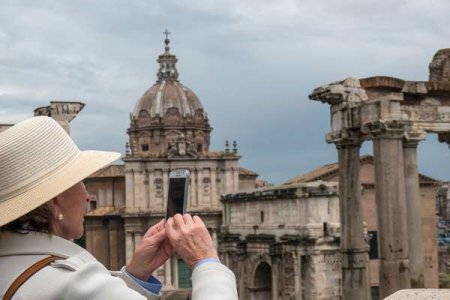Don't fall victim to these 7 common travel scams
Travelling is an enriching experience, full of wonder and the opportunity to discover new destinations and cultures.
However, like most things in life, it can have its downsides, such as the potential to become a means for scammers to victimise innocent people.
It is important to stay informed about prevalent travel scams to avoid falling victim to crafty con artists.
A recent report by insurance firm InsureandGo shed light on the top five travel scams currently affecting travellers. Let's look at these scams and learn how to avoid them.
Overcharged Taxi Rides
One universal scam, rampant in many parts of the world, involves taxi drivers overcharging unaware tourists or taking an unnecessarily circuitous route to inflate fares. There were instances where drivers drove away with a traveller’s luggage.
To avoid falling for this, always opt for recognised and correctly licensed taxis. Use an app-based ride service with transparent pricing, like Uber, or ensure the cab you're in has a working meter. Always negotiate and confirm the fare before embarking on your journey.
Friendly Strangers
Con artists often use amiability as a facade. Be cautious when a jovial stranger offers to guide you around or engage in casual conversation for language practice. They might entice you to dine at a restaurant where you'd be grossly overcharged, or they might disappear before the inflated bill arrives.
While interaction with locals is a highlight of travelling, maintain a grounded sense of suspicion. Politely decline unsolicited invites to unfamiliar establishments, stating you have other plans.
Restaurant Scams
The allure of authentic local cuisine can sometimes lead you to a scam. Be wary of restaurants charging exorbitant mandatory tips, billing you for unordered appetisers, or overpricing basic items.
Before choosing a place to eat, research its reputation on several platforms like Google or TripAdvisor. Consult fellow travellers or local advice about dining options to bypass scam-ridden venues.
Photo Opportunities
Street performers add character and charm to your travel experience. While taking photos with them may seem novel, it's crucial to remember they are working to make a living. If you snap a picture without paying, you might be forced to cough up some cash.
Enjoy the street shows, but be prepared to tip if you wish to document the experience. Alternatively, you can enjoy the performance without taking photos.
Pseudo Freebies
Beware of accepting 'free' gifts such as flowers or bracelets from strangers while travelling. These gifts usually come with an expectation of a donation or payment.
The best strategy is to politely decline unknown offers. Remember: it’s exceptionally rarefor a free gift to be actually free.
Money exchange scam
When arriving at a foreign country, the first agenda on the list is to obtain the local currency. Some might opt to withdraw from a local ATM, and some might choose to exchange their cash on a money exchanger.
But beware, there are money changers who pull a sleight of hand while counting the money and give you a lesser amount than expected. An Adelaide traveller experienced this first-hand in Bali. You may read more about the story here.
To avoid this scam, research ahead for reputable money exchangers in your destination. When exchanging, keep the changer from touching the money once you've counted it.
Travel site scam
As a traveller, you also need to plan the accommodation and the itinerary of your trip. Several trustworthy platforms help you plan your holidays online, but be careful because some travel sites are susceptible to phishing.
Recently, a story broke involving the popular travel platform Booking.com. Reports revealed that customers have received 'confirmation' emails to scam recipients into revealing their bank details.
More than that, the travel website has confirmed to a news source that some of its worldwide accommodation partners have fallen prey to an intricate phishing scam where unknown hackers swoop in to steal unsuspecting customers' credit card details. You can read more about this story here.
The company warned their customers: ‘As a rule, it’s important to remember that Booking.com will never require customers to provide credit card details by text, message or email.’
Navigating a new locale and its customs can be intimidating, but with awareness and vigilance, you can enjoy your adventure scam-free. As always, when in doubt, trust your gut instinct.
Remember, stay cautious and safe on your travels.

Have you experienced any of these scams while travelling, members? Let us know in the comments below!
However, like most things in life, it can have its downsides, such as the potential to become a means for scammers to victimise innocent people.
It is important to stay informed about prevalent travel scams to avoid falling victim to crafty con artists.
A recent report by insurance firm InsureandGo shed light on the top five travel scams currently affecting travellers. Let's look at these scams and learn how to avoid them.
Overcharged Taxi Rides
One universal scam, rampant in many parts of the world, involves taxi drivers overcharging unaware tourists or taking an unnecessarily circuitous route to inflate fares. There were instances where drivers drove away with a traveller’s luggage.
To avoid falling for this, always opt for recognised and correctly licensed taxis. Use an app-based ride service with transparent pricing, like Uber, or ensure the cab you're in has a working meter. Always negotiate and confirm the fare before embarking on your journey.
Friendly Strangers
Con artists often use amiability as a facade. Be cautious when a jovial stranger offers to guide you around or engage in casual conversation for language practice. They might entice you to dine at a restaurant where you'd be grossly overcharged, or they might disappear before the inflated bill arrives.
While interaction with locals is a highlight of travelling, maintain a grounded sense of suspicion. Politely decline unsolicited invites to unfamiliar establishments, stating you have other plans.
Restaurant Scams
The allure of authentic local cuisine can sometimes lead you to a scam. Be wary of restaurants charging exorbitant mandatory tips, billing you for unordered appetisers, or overpricing basic items.
Before choosing a place to eat, research its reputation on several platforms like Google or TripAdvisor. Consult fellow travellers or local advice about dining options to bypass scam-ridden venues.
Photo Opportunities
Street performers add character and charm to your travel experience. While taking photos with them may seem novel, it's crucial to remember they are working to make a living. If you snap a picture without paying, you might be forced to cough up some cash.
Enjoy the street shows, but be prepared to tip if you wish to document the experience. Alternatively, you can enjoy the performance without taking photos.
Pseudo Freebies
Beware of accepting 'free' gifts such as flowers or bracelets from strangers while travelling. These gifts usually come with an expectation of a donation or payment.
The best strategy is to politely decline unknown offers. Remember: it’s exceptionally rarefor a free gift to be actually free.
Money exchange scam
When arriving at a foreign country, the first agenda on the list is to obtain the local currency. Some might opt to withdraw from a local ATM, and some might choose to exchange their cash on a money exchanger.
But beware, there are money changers who pull a sleight of hand while counting the money and give you a lesser amount than expected. An Adelaide traveller experienced this first-hand in Bali. You may read more about the story here.
To avoid this scam, research ahead for reputable money exchangers in your destination. When exchanging, keep the changer from touching the money once you've counted it.
Travel site scam
As a traveller, you also need to plan the accommodation and the itinerary of your trip. Several trustworthy platforms help you plan your holidays online, but be careful because some travel sites are susceptible to phishing.
Recently, a story broke involving the popular travel platform Booking.com. Reports revealed that customers have received 'confirmation' emails to scam recipients into revealing their bank details.
More than that, the travel website has confirmed to a news source that some of its worldwide accommodation partners have fallen prey to an intricate phishing scam where unknown hackers swoop in to steal unsuspecting customers' credit card details. You can read more about this story here.
The company warned their customers: ‘As a rule, it’s important to remember that Booking.com will never require customers to provide credit card details by text, message or email.’
Navigating a new locale and its customs can be intimidating, but with awareness and vigilance, you can enjoy your adventure scam-free. As always, when in doubt, trust your gut instinct.
Remember, stay cautious and safe on your travels.
Key Takeaways
- Insurance company InsureandGo identified common scams that target travellers.
- Taxi driver scams, including not having a meter and overcharging for a journey, emerged as a common trick.
- 'Kind strangers' offering to show travellers around could be potentially working on a commission for establishments, leading to overcharging travellers.
- Restaurants charging for unrequested appetisers or adding extortionate mandatory tips were also found to be a common scam.
- Snapping a picture of a street performer without paying might force you to cough up some cash, and accepting 'free' gifts from strangers usually comes with an expectation of a donation or payment.
- More scams include money exchange scams and travel site scams.
Have you experienced any of these scams while travelling, members? Let us know in the comments below!









